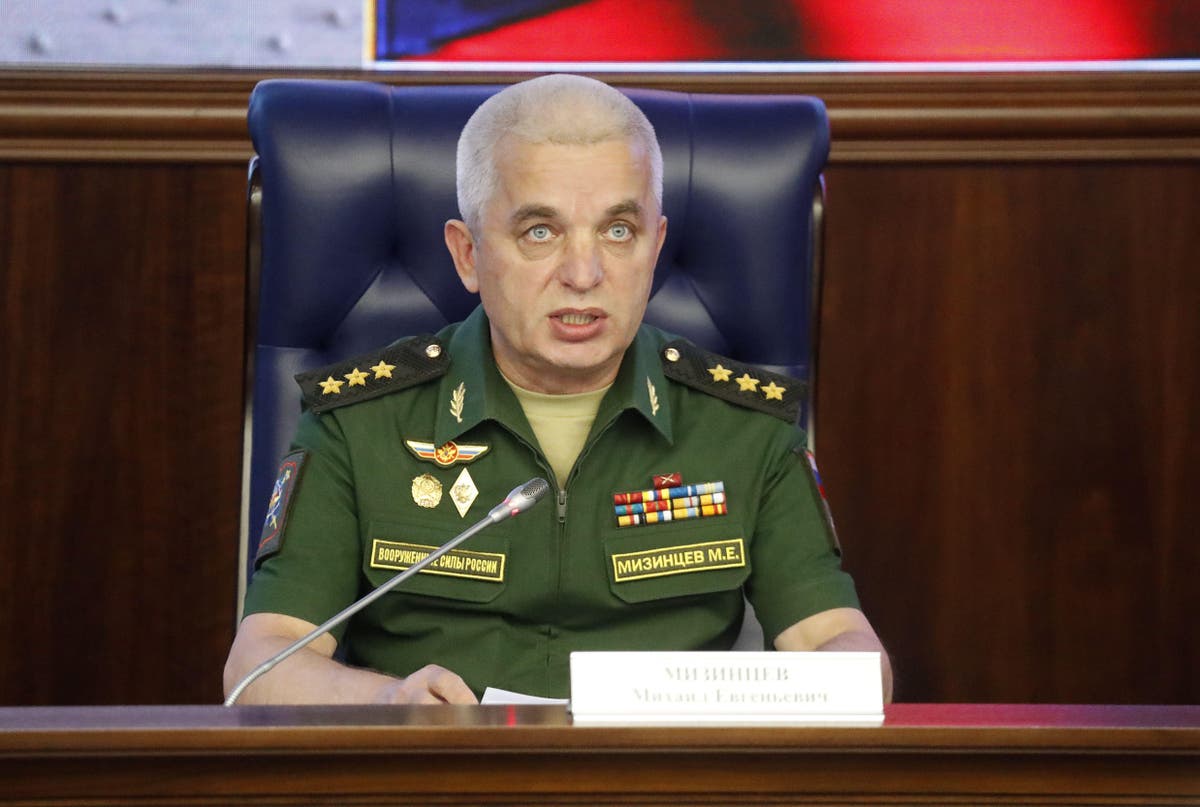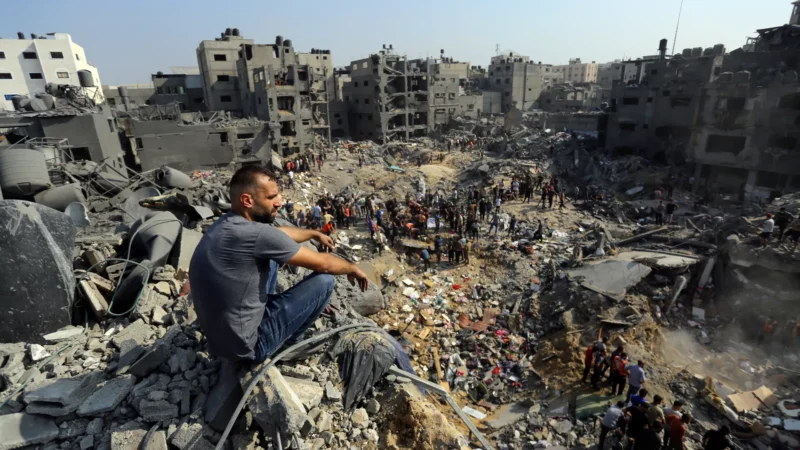Who is the Butcher of Mariupol? Sanctioned Russian colonel accused of hospital bombing

A Russian general dubbed the “Butcher of Mariupol” owing to his alleged brutal military tactics in Ukraine has been sanctioned by the UK.
Colonel-General Mikhail Mizintsev stands accused of ordering the destruction of a maternity hospital and theatre where more than a thousand civilians were sheltering in the Ukrainian southern port city Mariupol.
He also allegedly orchestrated Moscow’s bombing campaign in Syria which largely destroyed the city of Aleppo six years earlier.
The director of the chief of the National Defence Command and Control Centre, where Russian military operations are controlled, is among 14 new additions to the UK’s sanctions list, which includes prominent Russians such as media figures and military leaders.
Propagandist Sergey Brilev and Kremlin-funded TV-Novosti, which owns the RT news channel, have also been added to the list.
Aleksandr Zharov, chief executive of Gazprom-Media, Alexey Nikolov the managing director of RT and Anton Anisimov, the head of Sputnik International Broadcasting were also sanctioned.
The Foreign Office said Mizintsev is known for using “reprehensible tactics”, including shelling of civilian centres in Aleppo, Syria.
Mikhail Mizintsev, Russia’s Colonel General and head of the National Centre for State Defence Control, speaks in Moscow in 2018 (Alamy Stock Photo)
Foreign secretary Liz Truss added: “Putin’s war on Ukraine is based on a torrent of lies. Britain has helped lead the world in exposing Kremlin disinformation, and this latest batch of sanctions hits the shameless propagandists who push out Putin’s fake news and narratives.
“We will keep on going with more sanctions to ramp up the pressure on Russia and ensure Putin loses in Ukraine. Nothing and no one is off the table.”
According to Sergei Bratchuk, spokesman for the military headquarters in Odesa, Mr Mizintsev is personally in charge of the siege of Mariupol.
The city, on Ukraine’s Azov Sea coast, has seen some of the most intense fighting of the month-long war, prompting officials to warn it was being turned to “ashes”.
On 9 March, a Russian airstrike devastated a maternity hospital in Mariupol, killing at least three and injuring 17.
✕ Mariupol theatre: Video purportedly shows aftermath of March 16th bombing
A week later, on 16 March, a Russian bomb flattened a theatre despite the word “children” having been scrawled in huge white letters on the pavement next to it to indicate that civilians were sheltering inside.
Around 300 people were killed in that airstrike, Ukrainian authorities said on Friday, in what would make it the war’s deadliest known attack on civilians yet. There were also reports from the UN on Friday of the expectation of mass graves in the city.
The bloodshed is certain to fuel allegations Moscow has committed war crimes by killing civilians, a charge that is also levelled directly at Mr Mizintsev.
Oleksandra Matviichuk, head of the Centre for Civil Liberties in Ukraine, tweeted a photo of Mr Mizintsev and said: “Remember him. This is Mikhail Mizintsev. He is leading the siege of Mariupol. It was he who ordered the bombing of a children’s hospital, the drama theatre etc. He has huge experience of destroying cities in Syria. We’ll take care of the meeting him in the Hague #RussianWarCrimes.”
Photos emerging during Russia’s attacks on Ukraine bear similarities with the images taken during the Syrian Civil War. A photo dated on March 12, 2022 (top) shows destruction in the districts of the city that were the subject of the bombings and which are located near the front in Kharkiv, Ukraine and a photo dated on August 10, 2014 shows debris of buildings after barrel bomb attack by helicopters in Aleppo (Anadolu Agency via Getty Images)
Russian warplanes carried out a devastating bombing campaign in Syria alongside President Bashar al-Assad’s own forces in 2016.
The divided city of Aleppo was the scene of some of the country’s fiercest fighting and large swathes of it were reduced to rubble.
Images being shared of bomb-damaged Ukrainian cities next to war-ravaged Aleppo suggest Russians are employing similar tactics in their latest conflict.
Residents walk through the destruction of the once rebel-held Salaheddine neighborhood in eastern Aleppo in 2017 (AP)
People walk through mounds of rubble which used to be high rise apartment buildings in the once rebel-held Ansari neighborhood in eastern Aleppo, in 2017 (AP)
Mr Mizintsev’s reputation for ruthlessness extends to his treatment of Russian soldiers, according to an intercepted phone call which was made public by Ukrainian officials. In it, he is heard apparently threatening to have the ear of a junior officer whose uniform was not correctly worn cut off.
“Look at that scum standing there, frowning with his bovine eyes, showing me his unhappy face, his stinking mug,” he is heard saying.
“Why is he still serving? And why should I have to waste my time with your scum? If you’re the head of a unit, then step up to the plate. Why has his face not been messed up? Why has his ear not been cut off? Why is he not limping by now?”
Mariupol, which is normally home to about 400,000 people, has been under heavy bombardment for weeks.
Civilians trapped there have been sheltering in basements with little food, power or running water.
A view onto the yard of a maternity hospital damaged in a shelling attack in Mariupol earlier this month (AP)
Damaged buildings in Mariupol, from where civilians are being evacuated along humanitarian corridors (Anadolu Agency via Getty Images)
Mr Mizintsev had appealed to Ukrainian troops defending the strategic port to lay down arms and exit the city via humanitarian corridors, but that proposal was quickly rejected by the Ukrainian authorities.
Ukraine’s deputy prime minister Iryna Vereshchuk said in remarks carried by Ukrainska Pravda news outlet that Kyiv already had told Russia that “there can be no talk about surrender and laying down weapons.” She rejected the Russian statement as “manipulation.”
Additional reporting by agencies
The Independent has a proud history of campaigning for the rights of the most vulnerable, and we first ran our Refugees Welcome campaign during the war in Syria in 2015. Now, as we renew our campaign and launch this petition in the wake of the unfolding Ukrainian crisis, we are calling on the government to go further and faster to ensure help is delivered. To find out more about our Refugees Welcome campaign, click here. To sign the petition click here. If you would like to donate then please click here for our GoFundMe page






